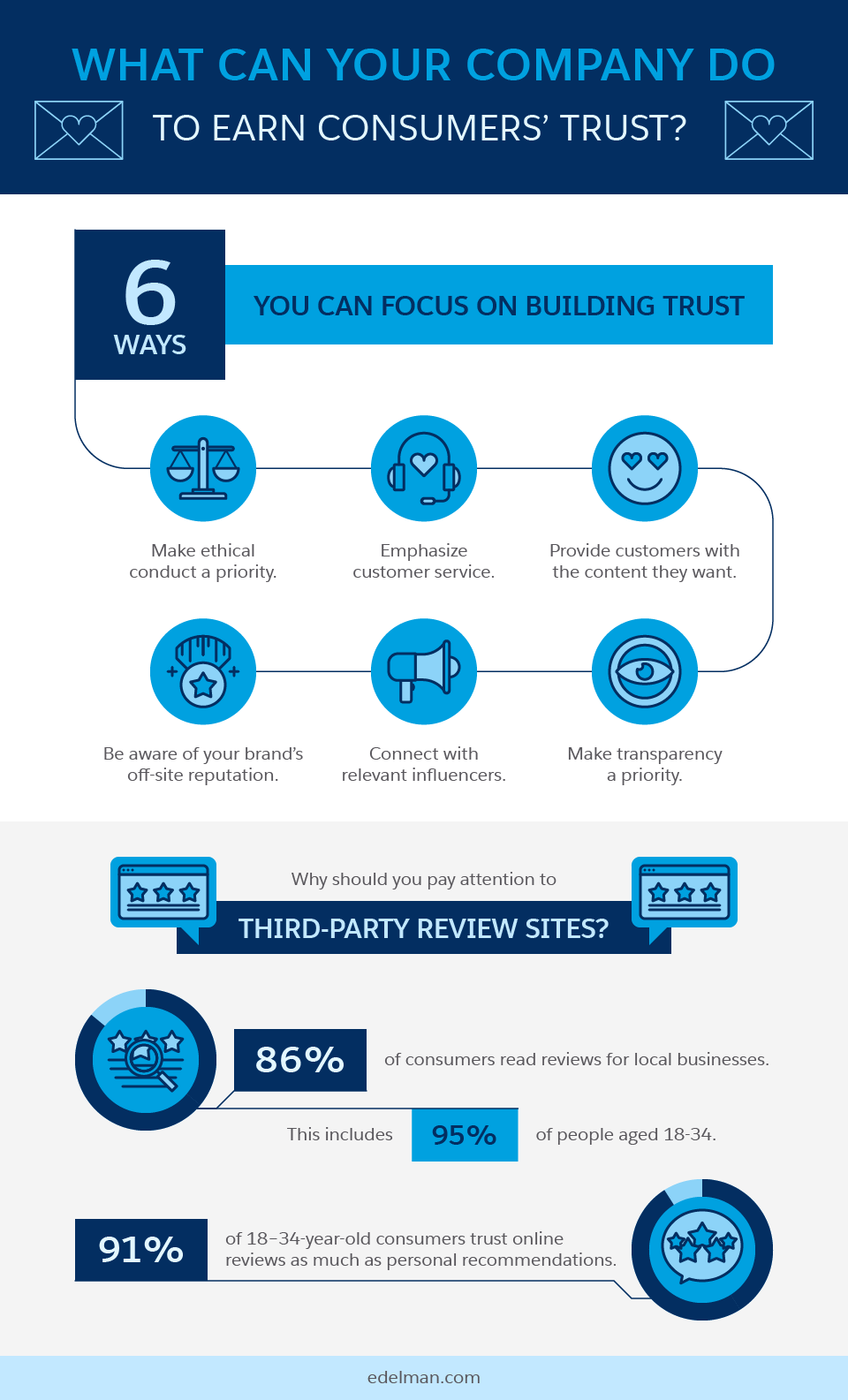By Laura Newcomer
Building customer trust has always been important for companies, but perhaps never more so than today.
CEOs around the world are concerned about consumer trust in business, and rightfully so. Edelman, a global communications firm, published “2019 Edelman Trust Barometer Special Report: In Brands We Trust?” The company reported:
A major consideration for brand purchase is now “I must be able to trust the brand to do what is right,” at 81 per cent.
More than 70 per cent link purchase to considerations that historically were tied to trust in corporations, including supply chain, reputation, values, environmental impact, and customer before profit.
Business leaders have reason to be concerned: Consumer trust is essential for building and sustaining a viable company. To develop or regain consumer trust, it’s important that your company act with integrity at every level of management and in every interaction with your customers. Let’s explore how to do just that, plus discuss why it’s important to build customers’ trust in the first place.

The Importance of Trust
Global research from Gallup, which was conducted in 2017, found that more than two-thirds of adults around the world believe business corruption is widespread in their country. This means many consumers don't have enough trust in corporations. In many cases, that’s justifiable — consider, for example, that data breaches and a lack of corporate social responsibility regularly make headlines both nationally and abroad.
This unfortunately means that companies aren't starting from neutral ground when it comes to building customers' trust. They're starting from behind, and it takes effort to make up for lost ground and establish authentic relationships and a trusting relationship with consumers. That's especially true in today's globalized context: Customers have more companies to choose from than ever before, and many companies aren't able to build in-person relationships with their customers.
To make up for the lack of personal contact, many customers rely on other factors to assess a company's trustworthiness, including:
- Its ethical track record
- The way it treats its customers and employees
- The quality of its products and services
- Its commitment to social responsibility
Corporate responsibility is especially important to younger generations who generally don't want to support companies that are engaged in unethical practices.
Why is it worth investing in these practices and other markers to boost consumer trust? There are many good reasons, not least among them is that It’s the right thing to do.
- Customers are more likely to purchase from a brand they trust than one they don't.
- Consumer trust enhances the odds that customers will remain loyal to your brand over the long term.
- Customers who trust in your brand are likely to recommend it to their network of friends, family members, colleagues, and so on, thereby marketing your company via word-of-mouth advertising.
- Customers are willing to spend more with companies that have earned their trust.
- Establishing trust with customers means they'll be more likely to forgive your company if, or when, it makes a mistake.
It’s no doubt clear: Your company should be committed to building customer trust at every point of contact.

How Companies Can Earn Customers' Trust
Consumer trust starts with good business practices. Customers are more inclined to trust in a company that creates quality products or services, charges a fair price for those offerings, receives good ratings and reviews, and treats them and other customers well. Here are some guidelines for making these factors integral pillars of your brand.
1. Make ethical conduct a priority.
To establish a company culture that's premised on ethical conduct, it's essential to have buy-in from your entire staff. Integrity needs to be a priority for every member of the team, and management should practice and reinforce the definition and importance of ethical conduct on a daily basis. Make sure that integrity is prioritized both in customer relationships and in-house ones. Your team members should be treated just as well as your customers in order for your company to walk its talk.
2. Emphasize customer service.
This may be obvious, but some companies overlook the importance of providing great customer service. In fact, one study found that consumers perceive customer service as a test that reveals whether or not they're valued by a brand. To help consumers believe they're valued, deliver on customer service.
A lot goes in to successful customer service, but these elements are especially important:
- Empower your team with the information and authority they need to effectively address customers' issues.
- Respond quickly to customer questions and complaints.
- Provide customers with avenues for sharing feedback
- Have a plan in place to respond to feedback so customers feel heard.
3. Provide customers with the content they want.
Customers are more inclined to trust your brand if it's accurately speaking to their pain points and needs. To accomplish that, it's imperative that your marketing team take the time to research what customers want and then put that content in front of them. When you know what kind of content your customers want to see, you can build trust in your brand by consistently meeting those expectations.
4. Be aware of your brand's off-site reputation.
In addition to managing the content that your customers receive directly from your brand, it's important to be aware of your brand's reputation beyond your own site. Many customers try to read expert reviews before purchasing: 86 per cent of consumers read reviews for local businesses, including 95 per cent of people aged 18-34. Furthermore, almost 91 per cent of consumers aged 18 to 34 trust online reviews at a level that's on par with personal recommendations.
Because your brand's off-site "presence" can make or break consumers' trust, it's smart to do what you can to make that reputation as great as possible. That starts with being a company that's worthy of praise. Beyond that, it's also worthwhile to ask happy customers to review your business, products, or services on third-party platforms and websites.

5. Connect with relevant influencers.
Word-of-mouth marketing remains one of the most effective forms of building your brand and establishing trustworthiness. People trust others in their network more easily than they’ll trust a company, so you can speed up the trust-building process by connecting with influencers who have already earned trust with your target demographic. The key is to build an authentic relationship with influencers, so go for quality of relationships over quantity.
6. Make transparency a priority.
It's crucial that your brand clearly and consistently communicates its values and is transparent about how it's living up to and embodying those values every day. In fact, previous research shows many customers value transparency over cost, and some would switch from their regular brand to another one if the latter practiced more transparency.
Here's part of what transparency looks like: If you slip up, don't hide it from your customers. Instead, own up to mistakes, communicate clearly about how your company intends to address issues, and then follow through on those commitments. Your customers will appreciate your honesty.
Trust Helps Companies Thrive
Earning consumers' trust is essential for any business. Customers who trust your company are more likely to be loyal followers who continue to avail themselves of your products and services — and advocate for your brand — over the long term.
A variety of factors can enhance consumer trust, but very little is as important as this: If you want customers to trust you, do everything in your power to ensure that your team and your company practice the integrity that makes your brand worthy of trust in the first place.
Share "How Can Your Company Earn Consumers’ Trust" On Your Site



